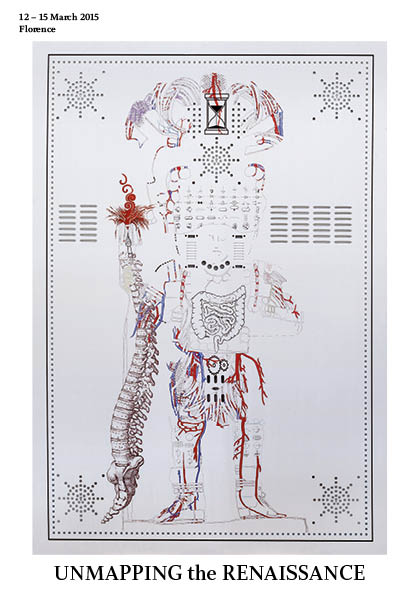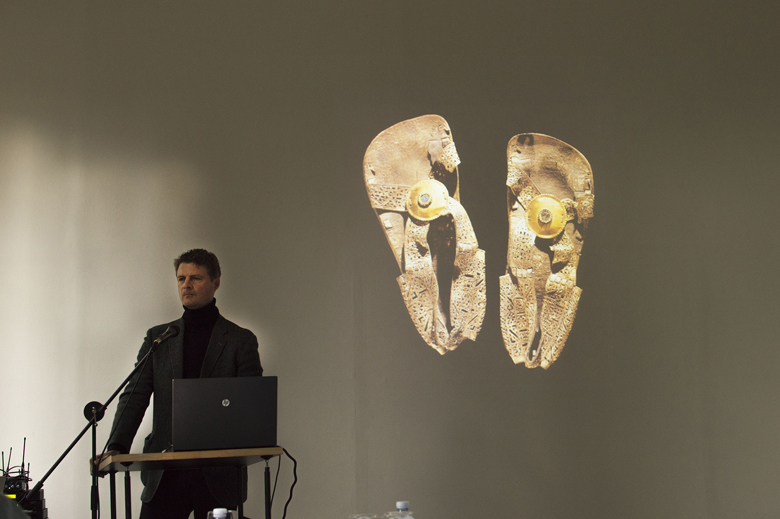Veranstaltungen
12.03. 15.03.2015
Symposium
UNMAPPING the RENAISSANCE


Walter D. Mignolo, From Global Linear Thinking to the MultiPolar World Order (The Darker Side of the Renaissance 20 years later), Sala Ferri, Palazzo Strozzi / Piazza degli Strozzi. Foto: Eva Sauer

Lecture, Andreas Siekmann, Kunsthistorisches Institut in Florenz – Max-Planck-Institut, Casa Zuccari. Foto: Eva Sauer

Lecture, Adam Herring, Place in the Sun: Synaesthetic Experience in Inca Peru, Villa Romana. Foto: Eva Sauer

Performance, Johannes Paul Raether, Dismembered City of Augmented Embodiments. Foto:Giacomo Laser
The city of Florence is regarded as the birthplace of the Renaissance. The fact that the economic and commercial power structures that developed during the Renaissance also impelled the colonization of non-European worlds – among other things through linguistic and semiotic hegemony – is to this day rarely incorporated into this Florentine narrative. In the tourism industry and in the sciences, eurocentric categories are each in their own way persistent, even – or especially – in times of rapidly progressing globalization: even as looking outward may become more natural, it often still turns into another confirmation of the accepted master narrative.
In recent years, though, we have also seen a growing awareness of the categories, and of the perceptual processes associated with it, develop in the context of a comprehensive transcultural turn. Post-colonial theoretical approaches, for example, question the role of the Latin alphabet, of printing, of language or of particular social ideals on whose flip side processes of dispossession, canonization and hierarchization of culture, memory and space unfolded – and can continue to unfold in the afterlife of the Renaissance narrative.
Since the 1990s, ethnographical and anthropological representations are being critically examined and aesthetic positionings are challenged in artistic inquiries and practices through chronopolitics and techniques of distancing. Contemporary art production is global and reflects the colonization of gazes and conceits.
In this sense the symposium UNMAPPING the RENAISSANCE follows critical resurveys of the mental map of a canonical and canonizing understanding of culture and period-concept: in a dialog between science and art, whose performative practices are intended to decidedly transcend established academic formats, the event considers the connections between hegemonic sign systems, imagination and (de-)colonial practices.
Program
Thursday, 12 March
Sala Ferri, Palazzo Strozzi / Piazza degli Strozzi
17pm
Keynote Lecture
Walter D. Mignolo, From Global Linear Thinking to the MultiPolar World Order (The Darker Side of the Renaissance 20 years later)
Mariechen Danz, A Voiced Gesture
Friday, 13 March
Biblioteca Laurenziana / Piazza San Lorenzo, 9
9.30 am
Introduction, Eugenia Antonucci, Il Codice Fiorentino
10 am
Lecture, Medina Lasansky, Was there an Italian Renaissance? And Whose Was it?
11.30 am
Lecture, Maria Thereza Alves, Some considerations about European concepts of Race since the Renaissance
Piazza Signoria > Ponte Vecchio
15 pm
Performance, Johannes Paul Raether, Dismembered City of Augmented Embodiments
Villa Romana / Via Senese 68
17 pm
Lecture, Hannah Baader, Mapping and Un-mapping the Maritime Renaissance
19 pm
Opening
The Anti-Humboldt-Box – A declaration
19.30 pm
Performance, AFROTAK TV cyberNomads present Adetoun Kuepper-Adebisi & Michael Kueppers-Adebisi Der Reichstag in the reMIX– Contemporary Epistemic Literature Sound & Image Archiving | Talking in Tongues Art & Multi-Media Interventions in Times of the new Global Renaissances
Saturday, 14 March
Kunsthistorisches Institut in Florenz – Max-Planck-Institut, Casa Zuccari / Via Gino Capponi 22
10 am
Lecture, Andreas Siekmann
11.30 am
Lecture, Alvaro Jose Guillen Jr.
Villa Romana / Via Senese 68
3.30 pm
Presentation, Gala Porras-Kim, Whistling and Language Transfiguration
4 pm
Lecture, Adam Herring, Place in the Sun: Synaesthetic Experience in Inca Peru
18 pm
The Anti-Humboldt-Box: A guided tour by Artefakte // anti-humboldt
19 pm
Screening: Liz Glynn, Hold Nothing, 2014
Sunday, 15 March
Villa Romana / Via Senese 68
11 am
Performance Lecture: Carlin Wing, Bounce, Ricochet, Rebound: Two Cases of 16th Century Ball Play
Final Meeting over Brunch
1 pm
Closing Performance: Gabriel Rossell Santillán: Lost knowledge – enlighten the world!
All lectures / performances will be held in English.
Streaming on radiopapesse.org
Click on Ascolta to join the symposium live.
Participants: Walter D. Mignolo, Prof. at Duke University, Durham, USA; Mariechen Danz, artist, Berlin; Medina Lasansky, Prof. at Cornell University Ithaca, NY; Maria Thereza Alves, artist, Berlin; Johannes Paul Raether, artist, Berlin, Villa Romana Fellow 2015; Hannah Baader, permanent research fellow at the Kunsthistorisches Institut in Florenz; Artefakte // anti-humboldt (Brigitta Kuster, Regina Sarreiter, Dierk Schmidt) artist/academic group, Berlin; AFROTAK TV cyberNomads (Adetoun & Michael Kueppers-Adebisi) Black German Education, Media Art & Culture Archive, Berlin; Andreas Siekmann, artist, Berlin; Alvaro Jose Guillen Jr., artist, Los Angeles; Gala Porras-Kim, artist, Los Angeles; Adam Herring, Associate Prof. at SMU Meadows School of the Arts, Dallas, USA; Liz Glynn, artist, Los Angeles; Carlin Wing, artist, doctoral candidate NYU, New York; Gabriel Rossell Santillán, artist, Berlin.
Initiated and organized by Mariechen Danz (artist), Angelika Stepken (Villa Romana, Florence) and Eva-Maria Troelenberg (Max Planck Research Group at the Kunsthistorisches Institut in Florenz).
This event is a joint project of Villa Romana and the Max Planck Research Group at the Kunsthistorisches Institut in Florenz – Max Planck Institut.



